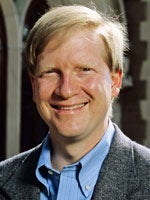Samuel Bagenstos ’93, deputy assistant attorney general for civil rights, U.S. Department of Justice, spoke last week at HLS on the Obama administration’s focus on enforcing disability rights at home and supporting them abroad.
In thinking about human rights, Bagenstos said, he always keeps in mind Eleanor Roosevelt’s line about the place where universal rights begin: “in small places, close to home.”
He asked the audience filling the room in Pound Hall to notice how many businesses just down the street on Mass. Ave. still have an un-ramped step outside the front door and imagine that duplicated on Main Streets across the country.
The Americans with Disabilities Act, Bagenstos said, involves the fundamental principle that disability shouldn’t limit one’s ability to live in the world. The 1990 law recognizes that “often a problem with disability is not a problem inherent in the bodies and minds of the people with disabilities, but instead is a problem of a society that fails to be accessible,” he said.
One of the priorities in the civil rights division of the Justice Department is enforcing the rights of access to public places close to home, and in the world—such as stores and restaurants, Bagenstos added.
“New buildings are accessible to people with disabilities because the ADA requires it. The unfinished business is making older buildings accessible, and we’re going to focus on that.”
Another priority of the administration is allowing people with disabilities to live at home rather than in institutions. Bagenstos described the massive institutionalization of people with disabilities that peaked in the U.S. in the 1950s and said the “major disability rights project” over the past 40 years has been to reverse that trend. He cited the 1999 Supreme Court decision, Olmstead v. L.C., in which the Court held that under the ADA, unjustified isolation of people with disabilities is discrimination. “It has been a failure of the ADA, since it was adopted,” he said, “that the Olmstead decision has not been enforced enough.”
In addition to enforcing the ADA, said Bagenstos, the Obama administration is moving towards more engagement with disability rights in other parts of the world. Bagenstos cited the U.S. signing of the U.N. Convention on Disabilities in August, in which the Harvard Law School Project on Disability and its Executive Director Michael Stein ’88, played an important role.
Although the U.S. already has strong disability law, said Bagenstos, its signature on the U.N. convention, recognizing the rights of people with disabilities around the world “and acknowledging that we have something to learn from the international struggle to implement them, is incredibly important.”
After his talk, Bagenstos tackled questions ranging from how to help other countries to enforce disability rights to a query from Dean Martha Minow about what the administration can to do prevent disability rights enforcement from getting bogged down in judicial technical debates.
Bagenstos replied that The Equal Employment Opportunities Commission and the Department of Justice would soon be issuing regulations that will attempt to make the coverage of the ADA clearer. As for judicial challenges to Congress’s power to enact the statute, he said that after initial defeats, efforts to fight them off have been very successful. “I’m cautiously optimistic that will continue.” But he added: “Should the Supreme Court decide that Congress lacked that power, that would be a major problem.”
Bagenstos’ speech was part of this year’s kick-off event for the Harvard Law School Project on Disability, which involves students in its work of promoting the rights of people with disabilities around the world. Also present at the event were Stein; Professor William Alford ’77, HPOD chair; as well as Minow, whom Bagentos said first showed him (when he was a student) “how disability law was a central part of the civil rights project.”
Bagenstos taught on the HLS faculty from 2000 to 2004 and is now on leave from the University Michigan Law School, where he is professor of law. His book, “Law and the Contradictions of the Disability Rights Movement” was published by Yale University Press this year.
